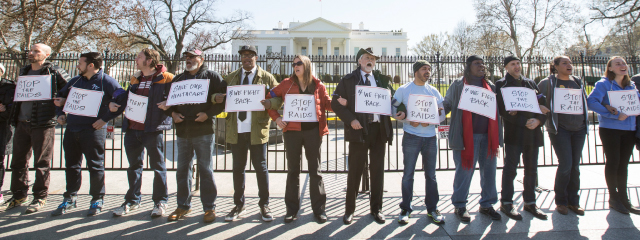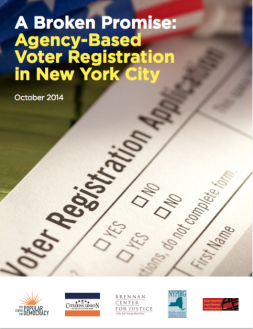A Broken Promise: Agency-Based Voter Registration in New York City
Summary
Executive Summary
Voter registration is the number one barrier to the vote. An estimated 51 million eligible citizens, more than 24 percent of the electorate, could not cast a ballot on Election Day in the 2012 presidential election solely because they had not been registered. Registration and voting rates are particularly low for families with annual incomes below $20,000, voters of color, naturalized citizens, and those with limited English proficiency. Civic engagement levels are even worse in New York State. Fewer New Yorkers registered to vote and cast a ballot in the November 2012 general election than the national average.
One proven method of increasing voter participation, particularly among underrepresented citizens, is voter registration at public agencies (“agency-based registration”). Well-administered voter registration programs established at public assistance agencies pursuant to federal law have helped register 15 to 20 percent of agency applicants. In 2000, New York City sought to expand voter registration opportunities at municipal agencies by enacting Local Law 29 (“the Pro-Voter Law”), which required 18 city agencies and, under certain circumstances, their associated subcontractors, to offer voter registration forms to all persons submitting applications, renewals, or recertification for agency services, or notifying the agency of a change of address. The law included each of the City’s 59 community boards as well. The last and only evaluation of the Pro-Voter Law, undertaken by the New York City Council over a decade ago, found that agencies were failing to offer voter registration.
In 2014, the Center for Popular Democracy, Brennan Center for Justice at NYU School of Law, Citizens Union of the City of New York, and the New York Public Interest Research Group formed the Pro-Voter Law Coalition and launched a new initiative to assess the agencies’ compliance with the law and opportunities to enhance the law’s impact. The Pro-Voter Law Coalition submitted Freedom of Information Law (FOIL) requests to each of the 18 city agencies; met with the Voter Assistance Advisory Committee at the New York City Campaign Finance Board; and, along with the Asian American Legal Defense and Education Fund and Make the Road New York, launched field investigations at 14 city offices subject to the Pro-Voter Law to measure their compliance with the law.
The FOIL responses and field investigations revealed widespread agency failure to implement the Pro-Voter Law. Specifically, they found:
- Inconsistent adherence. Documents provided by the 12 agencies that responded to FOIL requests indicated scattered and inconsistent attention to the Pro-Voter Law;
- Noncompliance in a majority of interactions. In 84 percent of client interactions, agency officials failed to comply with the Pro-Voter Law’s requirement to offer voter registration application forms;
- Failure to provide language access. Agency failures extended to bilingual voter registration mandates. Specifically, only 40 percent, or 2 out of 5 agency clients whose primary language was not English were given translated voter registration applications; and
- No training of agency staff. All 11 of the agency employees who responded to training inquiries admitted that no agency staff receive regular training on voter registration procedures.
These findings are particularly significant given that over 30 percent, or 18 of 59 citizen clients interviewed at the agencies required to comply with the Pro-Voter Law’s mandates reported they were not registered to vote.
Agency failure to comply with the Pro-Voter Law marks a lost opportunity to increase New York City voter registration rates and, by extension, voter participation in the city. Expanding opportunities for New Yorkers to register to vote at municipal agencies will require a concerted commitment by the Mayor, City Council, and municipal agency heads. The Pro-Voter Law Coalition is joined by the Asian American Legal Defense and Education Fund, the League of Women Voters of the City of New York, Common Cause New York, and Make the Road New York in issuing the following 12 recommendations to help ensure that every eligible city resident is registered to vote when interacting with city agencies subject to the Pro-Voter Law.












